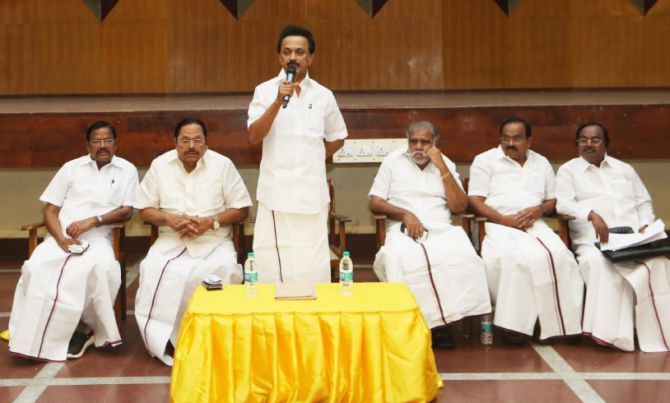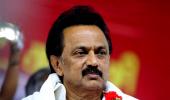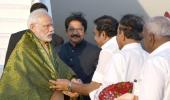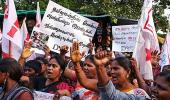The DMK parliamentary party appears to be a house divided, reports R Rajagopalan.

With an impressive 23 members and ranked as the third largest party in the Lok Sabha, one would think the Dravida Munnetra Kazhagam would be bounding with team spirit and camaraderie.
However, the converse is the case.
Some MPs, articulate first-timers mostly, are left with a feeling of discontent at the way things are being run in the parliamentary party by the seniors.
Never mind the disappointment at not being on the winning side of the election -- after DMK President M K Stalin built hope in Tamil Nadu of alliance partner Congress romping home and Rahul Gandhi becoming prime minister -- these MPs feel that even on the Opposition benches their voices are not being heard nor is their viewpoints respected.
The DMK has 23 Lok Sabha members and three Rajya Sabha members.
The MPs attend Parliament diligently and go through the motions, but this correspondent can state with authority, after having observed them from the press gallery as well as interacted with some of them, that the first-timers feel that they are being neglected.
Their sense of dejection has been heightened after seeing how the Bharatiya Janata Party pushes its new MPs to bring out their constituency issues to the fore during zero hour.
Despite Speaker Om Birla's stated policy to encourage first-timers, these DMK MPs feel that a group of four dominates their party's parliamentary proceedings.
Who are these four?
T R Baalu, Dayanidhi Maran, A Raja and Kanimozhi who, it can be seen from close observation, get precedence over those from the fifth or sixth row in the Lok Sabha.
The disaffected first-timers intend to bring this disparity to Stalin's notice in August when they return to Chennai after the Budget session concludes.
Another grouse these MPs have is the absence of a regular interaction mechanism within the DMK's parliamentary party to combine their efforts to focus Tamil Nadu issues in both Houses.
To achieve this, they suggest that regular meetings of the DMK parliamentary party be held on fixed days during session time where the constituencies' problems can be finetuned.
For instance, South Chennai MP Tamizhachi Thangapandian comes to Parliament after preparing for the day perusing the question papers, but she is not given time by party leader T R Baalu.
Similarly, S Ramalingam of Mayiladuthurai and C N Annadurai of Tiruvannamalai are bright, but feel stifled that their abilities are not being put to use by the DMK leadership.
If this is how DMK first-timers feel in private conversations, there are some seniors with four and five terms in the Lok Sabha who also feel slighted, like former Union minister S Jagathrakshakan and S S Palanimanickam Ganesamurthy of the Marumalarchi DMK who contested on the DMK symbol, who complain that while nominating members for the Business Advisory Committee it was A Raja whose name was put up, creating heartburn.
Raja was again proposed as a member of the panel of chairpersons, while the seniors expected one of them to be nominated.
The chairpersons panel has six members from different parties, and in the absence of the Lok Sabha Speaker one of them can chair the proceedings.
Given the high profile nature of the post, Jagathrakshakan and Palanimanickam expected it to go to one of them, and were naturally disappointed when Raja was chosen for it.
The senior MPs complain too that there is no coordination of the DMK parliamentary party nor is there a prior consultation process within the party, because of which pivotal positions are allocated among the senior group of four.
Another grouse involves the 11 standing committees of the Lok Sabha dealing with important policy issues in the agriculture, defence, external affairs, finance and commerce ministries.
While there was a tug of war among the seniors to capture the defence, external affairs and commerce panels, the first-timers were not even told the of the importance of these committees, and were allotted to lighter ministries like earth science, and programme implementation.
The old-timers fought to be made members of the environment and forest standing committee, but T R Baalu was not very obliging.
Not just the Lok Sabha members, even the DMK's Upper House members like R S Bharathy, T K S Elangovan and Trichy Siva saw their selection foiled by the whims of the group of four.
Senior DMK MPs feel Baalu should have consulted Stalin and not take unilateral decisions.
Further, Speaker Om Birla informally consulted the DMK to nominate two MPs to be included on his foreign visits as delegation members.
While the first-timers want their names to be penciled in, there is no mechanism to select the members and it is left to the party to nominate who it decides.
In 2019, there are eight foreign visits proposed by the ministry of parliamentary affairs, and pressure is building on Stalin to get their names included.
Also, while associations like FICCI and CII invite first-timers, MPs like Thangachi, Chinnaraj or Annadurai are not being included to represent the DMK at these forum meetings despite it being the third single largest party.
If their programmes and policies are not reflected at these association meetings, how would industrialists make out the focus of the DMK, ask these MPs, especially since these fora are used by industrialists who want to invest in Tamil Nadu.











 © 2025
© 2025